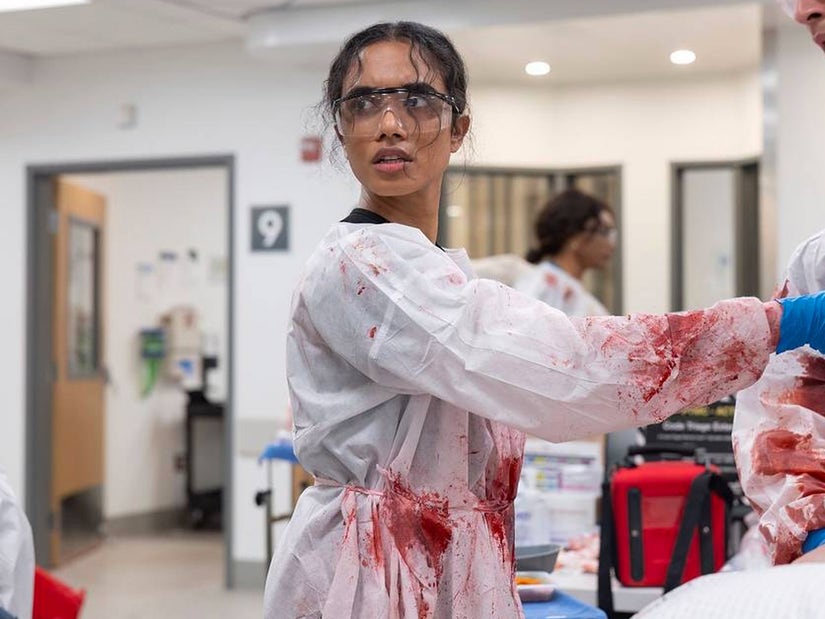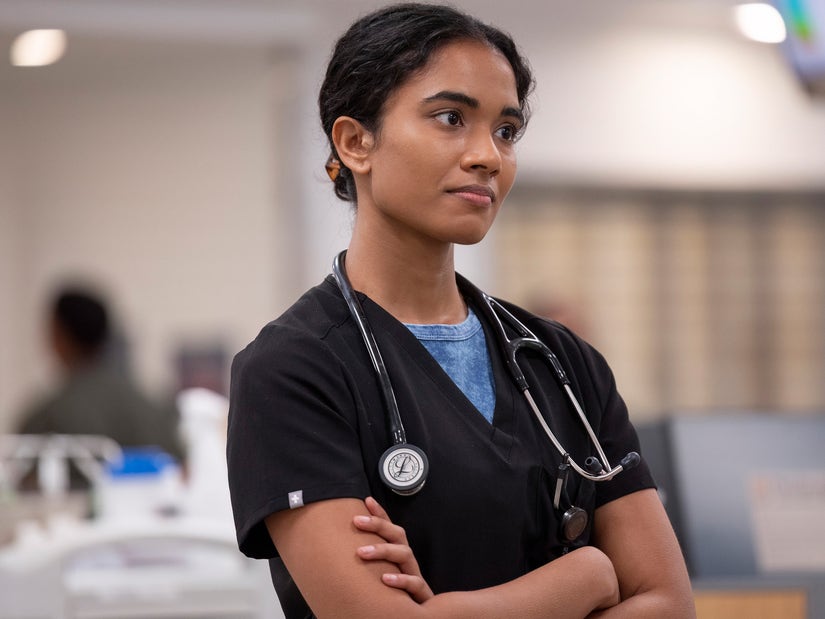
Ganesh — who stars as Dr. Samira Mohan in the Max medical drama — also reflects on the significance of The Pitt featuring a mass shooting, and shares why she believes her character is a response to “the medical industrial complex.
Warning: This post contains spoilers about the season finale of The Pitt.
The Pitt star Supriya Ganesh is breaking down Mohan’s breakdown in the Season 1 finale.
In an interview with TooFab, the actress — who stars as Dr. Samira Mohan in the Max medical drama — detailed the process of filming her character’s adrenaline high and subsequent crash in the wake of the mass shooting at PittFest.
 Max
Max
On Thursday’s finale, Ganesh’s Mohan gets a major adrenaline high after the ER begins to die down after the mass casualty event, in which they treated over a hundred shooting victims. While the day shift begins to transition out, an overly chipper Mohan appears to want to keep working, before Dr. Cassie McKay (Fiona Dourif) tells her to go home, saying she’s “running on an adrenaline high” and is “going to crash soon.”
“I’d rather be here,” Mohan replies, to which McKay says, “This job can’t be your life, Samira.”
“It’s not! What? Because I’m not in a relationship and I don’t like socializing after work?” she hits back. “All of that other stuff can wait until I finish my residency and get to where I want to be in my career.”
Later, Mohan indeed has an adrenaline crash, and breaks down in tears in the bathroom.
“I remember getting the script and just thinking, ‘OK, I need to research what this feels like for doctors,'” Ganesh recalled to TooFab. “And so I spoke to a bunch of med techs who were on our set where they would talk about how it would just be the sudden wave of just emotion that would come up once they were like done with a shift, especially when you don’t really know that that’s about to happen. You think that you want to stay a little bit longer or stay in the hospital a little bit longer. And then all of a sudden you’re home and you’re just like, ‘Whoa, I just did this incredibly traumatic thing on a 2-year-old and I saw all of that. I don’t know how to get rid of those memories.'”
Ganesh added that it a “very easy to pull on those memories” because they had just finished filming the penultimate episode, in which Mohan performs a cardiac pulmonary embolism.
“I mean, the actor was so great in conveying the grief that he went through in his last few moments with that scene,” she recalled. “And then there were so many other scenes where it was just so hard to film ’cause you just see these like really traumatic things, right?”
After shooting the difficult scenes with the shooting victims, Ganesh said filming Mohan’s breakdown came naturally.
“I remember filming the crash, and it just all came up, like, it just felt so natural — this just grief that we’re in this situation as a country, as a hospital system, as doctors,” she explained.
“That was just such an amazing moment to film. And it felt really cathartic as well,” she added.
As for the adrenaline high, meanwhile, Ganesh said she also consulted with the med techs on set to learn how “that felt in their body.”
“[It] was very fun to play with, for sure,” she added, joking that she had an “extra Diet Coke” that day to give herself a little boost.
Ganesh went on to dive further into how she prepared to film Mohan’s adrenaline high and crash, including McKay’s comments that the ER can’t be her entire life.
“I think classifying it as just one thing is too simple,” she told TooFab. “I mean, she does need to get a life. I remember another thing that kept coming up when I was even filming the adrenaline high scenes was, ‘Well, I can’t go home. There’s nothing to go home to. There’s nothing to go home to.'”
“I think [McKay] even says, ‘You’re gonna crash.’ And I say, ‘Well, I’d rather be here.’ I’d rather be here when I crash, ’cause everything I have is here. You know, I don’t wanna go home because I don’t have anyone to decompress with,'” she continued, adding, “I definitely think there is this sense of grief in being like, ‘I’ve sacrificed so much to get here and I’ve hit this career high and it doesn’t feel right because it is … all of this is just so awful to experience. And I’m working in the system that I don’t really know, wants me to be here. I don’t know if this is what I want to do.'”
“It’s just so many complicated feelings about everything,” Ganesh concluded. “I think that’s going on for her. And I think the finale just does such a good job of exposing all of that about Samira.”
Ganesh also reflected on the The Pitt’s decision to have a mass shooting as the season’s “big event,” shedding light on yet another major crisis in the country — and in healthcare — today.
“I just thought that was such a ballsy move for everyone on the show to do, especially because and I think this needs to be a conversation around gun control so much more,” she told TooFab. “I mean, the gun control issue we have in this country is a public healthcare crisis. It is the leading cause of death for children, even more so than cancer, which is absurd.”
“I think if we start addressing this as, ‘Well, people are just dying. Like, we need to do something about it,'” she continued. “Maybe that’s going to change the conversation and centering it around the fact that … I mean, the hospital system is overwhelmed and you’re kind of adding things that could overwhelm it further in the environment. I just think the show just does such a good job of exposing all of that for sure.”
Earlier in the season, Mohan regularly receives critical reminders from Dr. Michael “Robby” Robinavitch (Noah Wyle) to be faster with her patients as she noticeably spends more time with them than other doctors at the ER, even earning the nickname “Slo Mo” by her peers.
Despite possibly not meeting her quota, Dr. Mohan’s approach proves successful with multiple patients. By learning more about her patients and their personal lives, she’s able to take in essential information that others may have overlooked — and utlimately properly diagnosis them.
 Max
Max
Ganesh said she “absolutely” believes her character was written as a response to a frequent issue in our healthcare system of how patients — incuding women in particular — often feel that doctors don’t listen to them and want them to get out of there as soon as possible.
“The second I read her, I was like, ‘Oh, this is a response to the medical industrial complex,'” she told TooFab. “It’s the one thing a lot of my friends who are doctors say is that they they mention how they have to hit a certain patient quota because of insurance every hour, which is so crazy. I think it’s four an hour or something like that, which is so insane because even being TV doctor, I’m kind of like, ‘I think they can only do one an hour. That is the most I could possibly do without feeling like I’m going to kill someone.'”
“It is interesting because yes, there’s flip sides to her where she is a burden on her colleagues, but that’s not really their fault,” she continued. “It’s kind of the system’s fault. Like, ‘I’m taking a more holistic approach in a system that doesn’t really want me to do that.’ Arguably, arguably medical industrial complexes are built more so for profit than actually for patient care.”
Ultimatley, Ganesh said Mohan is the “person pushing against the system and she is in a system that doesn’t really want her to exist there.”
She also shared that she’s “grateful” to portray a doctor who helps diagnose patients of color whose condition might have been overlooked. Ganesh used the patient Nandi, a beauty influencer, (Sasha Bhasin) as an example. While other doctors were quick to diagnose Nandi’s erratic behavior as a psychiatric illness, Dr. Mohan learned that her symptoms were caused by mercury poisoning due to an imported face cream.
“I think she is such a good doctor for someone who maybe sometimes won’t be believed or would be misdiagnosed,” Ganesh told TooFab.
“Nandi, the psych patient,” she continued. “I mean, I can talk day and night about how so many, so many psychiatry holds end up being skewed towards more so people of color, right? Even if they don’t really have higher rates of incidents in psychiatric illnesses. So it’s definitely interesting playing a character like this. And I just, I feel so grateful to have had that opportunity.”